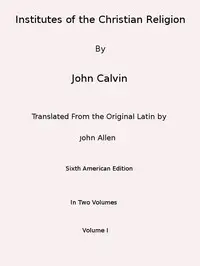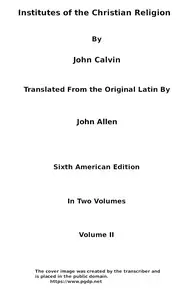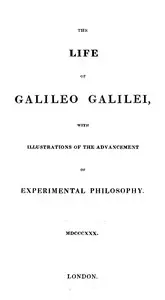"Institutes of the Christian Religion (Vol. 1 of 2)" by John Calvin is a theological foundation written in the early 16th century. This work is a systematic presentation of Christian doctrine, aiming to provide a comprehensive understanding of God, humanity, and the means of salvation through Christ. The author emphasizes the intricacies of faith, divine authority, and the necessity of Scripture in establishing Christian beliefs. The opening section of the text introduces the purpose of Calvin's work, noting its role in educating readers about true religion against the backdrop of the Reformation. It clarifies Calvin's intent to help individuals develop both a knowledge of God and an understanding of themselves—how human imperfection leads to a greater yearning for divine grace. The text establishes the importance of acknowledging God as both Creator and Redeemer, setting the stage for the in-depth theological discussions that will unfold in subsequent chapters. (This is an automatically generated summary.)

Institutes of the Christian Religion (Vol. 1 of 2)
By Jean Calvin
"Institutes of the Christian Religion (Vol. 1 of 2)" by John Calvin is a theological foundation written in the early 16th century. This work is a syst...
John Calvin was a French theologian, pastor and reformer in Geneva during the Protestant Reformation. He was a principal figure in the development of the system of Christian theology later called Calvinism, including its doctrines of predestination and of God's absolute sovereignty in the salvation of the human soul from death and eternal damnation. Calvinist doctrines were influenced by and elaborated upon the Augustinian and other Christian traditions. Various Congregational, Reformed and Presbyterian churches, which look to Calvin as the chief expositor of their beliefs, have spread throughout the world.

















